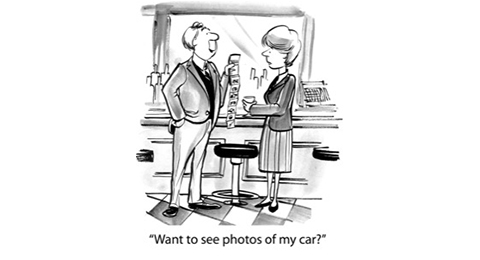03/06/2018
Mid-life crisis… What mid-life crisis?
 So the story goes, it was a Canadian guy in 1957 called Elliott Jaques who came to London and appeared at the British Psycho-Analytical Society as a fellow physician and psychoanalyst, presenting a paper he had written about his studies with a group of artists in their mid 30’s who, he claimed, experienced the extremes of this depressive condition. For other mortals he claimed this manifested as religious awakenings, promiscuity and a sudden inability to enjoy life, with concerns over their health and appearance and compulsive attempts to remain young sparked by the realisation that their lives were already halfway over and death was racing toward them. Jaques offered his own explanation by identifying himself as suffering from the same condition.
So the story goes, it was a Canadian guy in 1957 called Elliott Jaques who came to London and appeared at the British Psycho-Analytical Society as a fellow physician and psychoanalyst, presenting a paper he had written about his studies with a group of artists in their mid 30’s who, he claimed, experienced the extremes of this depressive condition. For other mortals he claimed this manifested as religious awakenings, promiscuity and a sudden inability to enjoy life, with concerns over their health and appearance and compulsive attempts to remain young sparked by the realisation that their lives were already halfway over and death was racing toward them. Jaques offered his own explanation by identifying himself as suffering from the same condition.
Who spotted the problem first?
Jaques identified that this went right back to a 14th century book by Dante Alighieri called The Divine Comedy where one of the male characters proclaims ‘midway upon the journey of our life I found myself within a dark forest, for the straight forward pathway had been lost’.
When did it become known in popular culture?
In the October 1965 issue of The International Journal of Psychoanalysis, Jaques paper was published under the title ‘Death and the Mid-life Crisis’.
The term resonated with society. Life expectancy in 1900 was significantly lower than it is today, so life at aged 40 definitely felt like the beginning of the end for this generation. Interestingly life spans in the richer countries of the world were increasing and conversely a new term arrived proclaiming ‘life begins at forty’ after the 1933 American non-fiction book by Walter Pitkin and the advent of industrialisation, new medicines and white goods meant that men no longer ‘wore out’ at forty.
A midlife crisis across society
By 1965 the average life expectancy in western countries had reached 70, so the midway point focussed minds on how they could reinvent themselves for the second part of their life. This was also at a time when women were going out to work in record numbers and men were re-evaluating their role in the family and in some cases feeling obselete. As a result divorce rates started increasing as women became more financially independent and couples realigned their lives. Suddenly the term mid-life crisis was everywhere. The meaning of the term blossomed to describe a person essentially out of control of their emotions who had stagnated and was feeling indecisive, restless, bored, in a hopeless ‘fenced in’ place, filled with dissatisfaction. It came to also represent a broader meaning too either for those who had achieved everything in life and couldn’t see the point of it all or those who felt they hadn’t achieved enough.
The definition of classic sufferers
Women were considered by this time to be on a separate track in life, governed by marriage, children and when they flew the family nest and of course the menopause. So women had taken back control of their lives, re-skilling or changing a life that didn’t suit.
Middle aged men, however, were busy re-evaluating their position in life, watched by the rest of society who observed that those in a mid-life crisis were:
- Middle or upper class
- White, professional males with time on their hands
- Leisure time rich with the means to afford sports cars and mistresses
As life expectancy continues to march forwards, there will no doubt be a shift in the actual age mid-life represents, which gives us all pause for thought, I am sure.
Is it a self fulfilling prophecy?
It can be argued that throughout our lives we face developmental changes that result in similar crises. For example, Americans expect their teenage girls to experience an adolescent crisis but in other parts of the world, for example in Samoa, people don’t expect teenage years to be an emotional melting pot… so they aren’t! So is the mid-life crisis a result of neurosis; a half pint empty attitude rather than a half pint full? Do these people actually have a number of crises throughout their lives and not just in mid-life?
More importantly the term now appears to be related to any crisis; a health problem, a job loss, a divorce but not to aging itself so today it is becoming less about biology and more about culture.
What happened to Elliott Jaques?
He considered that his paper on mid-life crisis formed a very small part of the catalogue of his life’s work and he went on to specialise in workplace relations…… but the world will always remember him for being the scientist who coined the phrase ‘Mid-life Crisis’.



 So the story goes, it was a Canadian guy in 1957 called Elliott Jaques who came to London and appeared at the British Psycho-Analytical Society as a fellow physician and psychoanalyst, presenting a paper he had written about his studies with a group of artists in their mid 30’s who, he claimed, experienced the extremes of this depressive condition. For other mortals he claimed this manifested as religious awakenings, promiscuity and a sudden inability to enjoy life, with concerns over their health and appearance and compulsive attempts to remain young sparked by the realisation that their lives were already halfway over and death was racing toward them. Jaques offered his own explanation by identifying himself as suffering from the same condition.
So the story goes, it was a Canadian guy in 1957 called Elliott Jaques who came to London and appeared at the British Psycho-Analytical Society as a fellow physician and psychoanalyst, presenting a paper he had written about his studies with a group of artists in their mid 30’s who, he claimed, experienced the extremes of this depressive condition. For other mortals he claimed this manifested as religious awakenings, promiscuity and a sudden inability to enjoy life, with concerns over their health and appearance and compulsive attempts to remain young sparked by the realisation that their lives were already halfway over and death was racing toward them. Jaques offered his own explanation by identifying himself as suffering from the same condition.